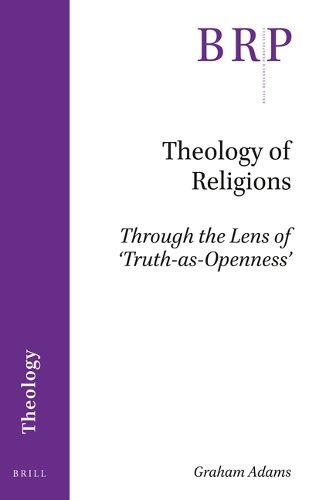Readings Newsletter
Become a Readings Member to make your shopping experience even easier.
Sign in or sign up for free!
You’re not far away from qualifying for FREE standard shipping within Australia
You’ve qualified for FREE standard shipping within Australia
The cart is loading…






In Theology of Religions Graham Adams maps and analyses the field of ‘theology of religions’ (ToR) and its various typologies, examining the assumptions in how religion is assessed. The purpose is to identify how contributions to ToR select and deselect material and trajectories, editing according to presuppositions and interests. Adams’ analysis consciously relies on Andrew Shanks’ Hegelian notion of ‘truth-as-openness’ (divine hospitality) as it illuminates three dynamics, or ‘scandals’, within ToR. The first, concerned with how a religion’s particularity or identity is constructed, is subdivided between ‘particularity transcended’ and ‘particularity re-centred’, along the lines of Jenny Daggers’ postcolonial insights. The second concerns the interactions when one religion engages an Other’s strangeness, and the third is concerned with how religions aim to transform socio-political systems that feign or obstruct universality, so as to effect ever greater solidarity. The text notes key trends, beyond Christianity and including deepening interdisciplinarity, and potential developments from a critical but constructive standpoint.
$9.00 standard shipping within Australia
FREE standard shipping within Australia for orders over $100.00
Express & International shipping calculated at checkout
In Theology of Religions Graham Adams maps and analyses the field of ‘theology of religions’ (ToR) and its various typologies, examining the assumptions in how religion is assessed. The purpose is to identify how contributions to ToR select and deselect material and trajectories, editing according to presuppositions and interests. Adams’ analysis consciously relies on Andrew Shanks’ Hegelian notion of ‘truth-as-openness’ (divine hospitality) as it illuminates three dynamics, or ‘scandals’, within ToR. The first, concerned with how a religion’s particularity or identity is constructed, is subdivided between ‘particularity transcended’ and ‘particularity re-centred’, along the lines of Jenny Daggers’ postcolonial insights. The second concerns the interactions when one religion engages an Other’s strangeness, and the third is concerned with how religions aim to transform socio-political systems that feign or obstruct universality, so as to effect ever greater solidarity. The text notes key trends, beyond Christianity and including deepening interdisciplinarity, and potential developments from a critical but constructive standpoint.